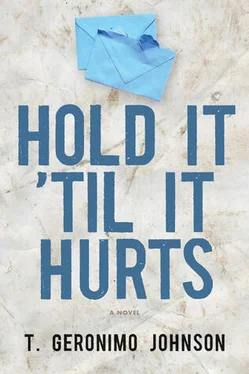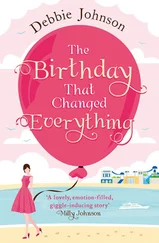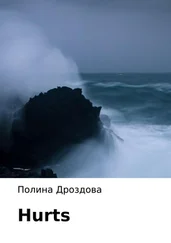He excused himself and went back inside. If they knew what was in the envelope and he didn’t, wouldn’t that make them even, restore balance? Wages said the warrior suffered for what he had seen, what he knew. Achilles’s burden was also his gift to them: Troy’s other life, emaciated and drugged, in exchange for their knowledge of his adoption. But by the time he was inside, he discarded this idea, crouching beneath the window to listen.
“I always wanted him. I was his godmother, and I was there the day he was born. Cecile, his mom, was my best friend. Her family had disowned her for marrying a white man before she married Achilles’s father. I knew them. They were good people, just from a different time. I babysat him all the time. He was with me the night they died. I already knew him like my own. I had him over here all the time. Still took almost a year to work the paperwork out. We couldn’t have kids, you know. We tried, but it never worked. Then he was there, like a gift. It was just a matter of making it legal. Troy was different. One day Bill comes home, says, ‘We have to take this kid. We have to.’ The way he says it. Well, I sign the paperwork, but I never ask to see the original birth certificate. I don’t want to. I exchange that for one condition: he can never tell Troy what’s in there either. Because Achilles was already here, and I didn’t want him to feel displaced.”
She went on to say more about his birth parents. By the time she was finished, Achilles was dizzy, his face hot. His parents were Cecile Octavia and Charles Richard Drew. He was born on March 2, 1983, not May 3, as he’d always thought. He wasn’t a Taurus. His parents died in an automobile accident less than three miles from where he grew up. Killed by a drunk driver. They weren’t street people. His real name was David Drew. He wasn’t Achilles.
These revelations so stunned him that he didn’t hear their chair legs scraping the deck, or the door, or his mother and Ines enter the kitchen to find him hunched over beside the window.
“Oh no,” said his mother, as Achilles slipped by her and out the door. He walked into the woods and through the culvert under the highway, officially entering Pennsylvania, and into the wooded hollow his father called Winter’s Last Bowl, a shady grove, the snow’s last refuge, sometimes glowing until late May. To make room for new houses, the trees had been cleared over the years, so what snow remained turned to mush and by spring was a mosquito nest. Had his father felt as if he was being gentrified?
He sat at the edge of the culvert to watch the sun finish rising. He had planned to take Wages’s hat, and Troy’s boots, and Teddy Ruxpin, and bury them all at the old asylum near the water tower, but he had left empty-handed. He looked back at the house, and it seemed so far away, everything felt as if it was all so far behind him, as if it had happened to another person.
His mom had mailed notices to Wexler, Merriweather, Dixon, and the others. God, how he’d wanted to see them, but he knew they wouldn’t show. The night they’d pledged revenge, they’d made another promise, spurred by Wages saying, “Remember me like this!” He clambered atop the Bradley to scan the ridge below, scaly as a reptilian spine. He stood there, binocs in one hand, M4 in the other, goggles off, red-faced and raccoon eyes smiling. Achilles preferred to remember him at City Park, feeding ducks and pigeons alike; Wexler hanging his head out of the chopper, mouth open, eating the sky, grinning to beat the band; Merriweather, teary-eyed, bouncing a little girl on his knee; Dixon wearing that balaclava with face holes in the back so you never knew if he was coming or going; Ramirez sweating over those mixtapes — should John Legend be followed by Marvin Gaye or that old Jeffrey Osborne joint? — his father snipping that fence; Troy at the kitchen table that night, thinking he was in a foster home, one moment asking how long they’d be there, the next yelling, Daddy, stop! If he had loved them any more, they would have held hands.
He found Ines in his room wearing jeans and a T-shirt, and packing. “Reagan?” he asked, attempting a joke. The nearest major airport was named after a president of whom Ines was not fond.
“I don’t know.” She shook her bag over the bed, dumping her belongings out, then starting repacking.
He took a deep breath. “I want you to stay. Or take me with you.”
“I don’t know, Achilles. I feel like I’ve been up for a month straight. I can’t decide anything right now. I’m happy to meet your family. Dreadfully sad, too. Your mother must think I’m crazy. Sometimes I was talking to her and just found myself staring, seeing so many of the little things you do. No matter what, children are like their parents. No matter what.”
He reached for her hand, and she let him take it. What if he and Ines had a boy? Would it be dark like him or light like Ines, playful or sullen, reserved, cool, and withdrawn, or, like his brother, damned near tireless?
“I’m confused about one thing: didn’t you say you identified Troy’s body in Atlanta?”
“I did. I did.”
She shivered. “Oh, Jesus. Achilles … the morgues.”
“I went back for the body, and it was gone. They’d cremated it already.” He told her the entire story, crying through half of it, his words unintelligible even to him. It was as if something twisted in him, something tightly knotted finally broke, and wave after wave of deafening, roaring grief washed over him.
After wiping his face, he smiled weakly. “I’m probably dehydrated.”
“Poor Troy. Poor Achilles.”
“I love you, Ines.” Maybe it was all like stepping into the void and hoping the night catches you. He didn’t know how he expected her to react to these magic words, but it wasn’t what she did next: dropping down to Troy’s bed as if she was exhausted, and groaning. “I know, but it’s not that easy.”
“What are you going to do?”
“I don’t know, Keelies. I don’t know,” said Ines. “Read it to me again, please?”
“What?”
“Your eulogy.”
She pulled the blanket high around her neck. Achilles unfolded the square paper he had been carrying in his wallet since the morgue.
I wet the bed until I was ten, if I had soda with dinner. So every night I drank Coke, I slept on the floor and washed my underwear out in the bathtub the next morning. But I kept asking for soda. Mrs. Tolson, I’m the one who broke your mailbox. I was deathly afraid of guns until twelve. These are things only my brother knew about me. When he died, I felt like most of me died too. Because we did everything together. But I realize that works both ways, that I have to let you know things about Troy, things that only I know. He was brave, you know that. He stood up to everyone. He never surrendered. He walked right into a minefield and carried one of our buddies out like it was nothing. Like it was a fly ball in the backfield. But here’s the crazy part: he never mentioned it again. Ever. Even that night, when Wexler was being medivaced. We’d walked him to the medivac copter and he’s teary-eyed. Troy had just saved his life hours before, that’s not an exaggeration. Our buddy says, “Thank you, man.” He’s full of thanks, but Troy says, “Never mention it again. Ever.” Later that night, I punched him. I’m sorry. I did. I was so mad. I’m the older one. I was supposed to be protecting him. He could have died. “Are you crazy?” I asked. “No,” he said. “Then why’d you do it?” He said, “Because you are who you make yourself, who you will yourself to be, against the odds. Because if we’d left him there, a part of ourselves would have stayed there forever, we would have died with him. We would have been haunted by it.” Then he kissed me on the forehead. I didn’t want to believe him at the time. In fact, I forgot all about this conversation until recently. But, he was right. The sign in the morgue where I found him reads Mortui Vivis Praecipant — Let the dead teach the living. That’s Troy’s lesson for us all.
Читать дальше












